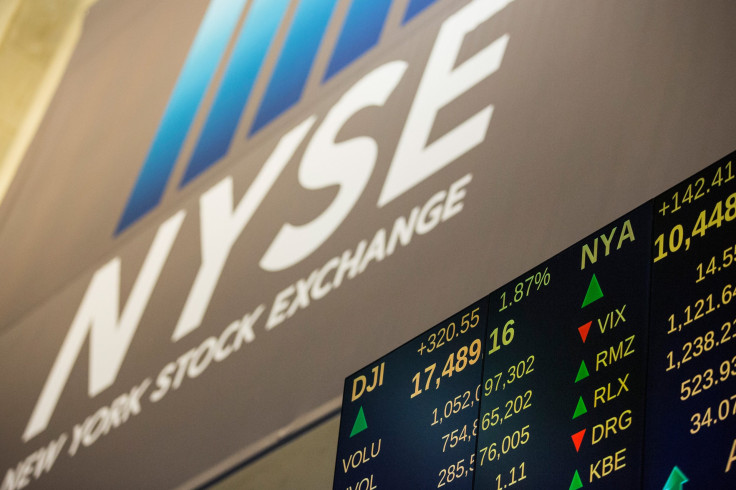Dow Jones Industrial Average Mostly Down Ahead Of Federal Reserve Meet, Lower Demand For US Durables

This story was updated at 4:15 p.m. EDT.
U.S. stocks followed global stocks downward Tuesday, ahead of a Federal Reserve meeting and some lackluster corporate earnings reports that signal the global economy is cooling. The U.S. Commerce Department said Tuesday that orders for long-lasting goods, from washing machines to airplanes, declined for a second straight month.
“The details of the report suggest that equipment investment expanded only modestly in the third quarter and could be even softer in the fourth quarter,” Steve Murphy, U.S. economist for Capital Economics, said in a note Tuesday. “The strong dollar, weak global demand, and the contraction in the energy and manufacturing sectors are all weighing on demand for capital goods.”
U.S. consumer confidence also declined to a three-month low, according to the U.S. Conference Board's monthly measure, which was released Tuesday. The measure of U.S. consumers' willingness to spend hit 97.6 in October, down from 102.6 in September and below economists' forecast 102.9. While the trend is lower, it's still above the historical average of 90.8. Nevertheless, the number shows that concerns about a global downturn and lower corporate earnings is weighing on sentiment.
The Dow Jones Industrial Average (INDEXDJX:.DJI) lost 41.62 points, or 0.24 percent, to 17,581 in Tuesday morning trading. The S&P 500 index (INDEXSP:.INX) declined by 5.29 points, or 0.26 percent, to 2,066. The Nasdaq composite (INDEXNASDAQ:.IXIC) shed 4.56 points, or 0.09 percent, to 5,030.
Nine out of 10 S&P 500 sectors were down by the closing bell on Tuesday. Energy stocks led declines as healthcare stocks were boosted by positive Big Pharma earnings.
European equities fell Tuesday afternoon, with the mining sector weighing on London-traded shares. News from Britain’s Office for National Statistics showing lower-than expected economic growth also weighed on investor sentiment. Britain’s gross domestic product increased 0.5 percent, less than had been expected. Construction activity contracted by 2.2 percent.
London’s FTSE 100 stock index closed down 0.81 percent to 6,365. The German DAX shed 1.01 percent to 10,692, while the French CAC 40 lost 1.02 percent to 4,847.
Investors are looking to the results of the year’s seventh Federal Open Market Committee (FOMC), which will be released Wednesday at 2 p.m. EDT. The FOMC meeting minutes will offer the latest sentiments from Fed governors over the prospect of raising interest rates before the end of the year. Most analysts don’t expect a rate hike this week, but will be looking for hints of when the rate liftoff will begin. Raising rates will increase the cost of borrowing, and could mark the beginning of the end of the era of cheap money that has pumped up equity markets and investors’ returns on investment.
Commodity markets continue to be weighed down by lower demand for metals from China and a global oil supply glut.
Oil prices edged lower on Tuesday, extending losses into the third consecutive week. West Texas Intermediate crude oil, the U.S. benchmark for oil prices, fell 1.82 percent to $43.18 per barrel for December delivery on the New York Mercantile Exchange. On the London ICE Futures Exchange, Brent crude, the global benchmark for oil prices, fell 1.54 percent to $46.81.
We’re well into the third-quarter earnings seasons. By Friday, about 67 percent of U.S. companies will have announced their July-September earnings results, according to S&P Capital IQ. Here’s are some select company earnings that came out Tuesday morning:
Ford Motor Company (NYSE:F) shares fell by more than 5 percent Tuesday after the Dearborn, Michigan, automaker announced beating Wall Street estimates on revenue but falling short on profit. The maker of the F-150 pickup and Lincoln brand cars attributed the profit miss to higher-than-expected taxes, but the bigger problem for carmakers is losses in emerging markets like Brazil and uncertainty about growth in China. Ford stock is down nearly 4 percent for the year.
Cummins Inc. (NYSE:CMI), the Indiana-based global diesel engine supplier, announced it would cut 2,000 jobs as it reported lower profits and revenue amid global economic weakness that has cut demand for its engines. Global sales plunged 18 percent in the July-September quarter. Cummins shares plunged nearly 9 percent on Tuesday. Its shares are down 29 percent for the year.
Alibaba Group Holding Ltd. (NYSE:BABA) shares jumped more than 4 percent on Tuesday after the Chinese e-commerce company said it grew its July-September quarterly revenue by 32 percent, to 22.2 billion yuan ($3.5 billion). Revenue from mobile devices almost tripled to $1.66 billion. Alibaba’s stock has shed nearly 24 percent of its value since the start of the year.
Pfizer Inc., the New York-based global biopharmaceutical company, reported a better-than-expected third quarter and raised its profit and revenue forecast. Both net income and sales were down, but less than Wall Street estimates. Demand for a breast cancer drug and a pneumonia vaccine helped drive performance for the quarter. Pfizer stock is up more than 12 percent for the year, including Tuesday’s 2.43 percent gain.
Merck & Co. Inc . (NYSE:MRK) shares rallied after the New Jersey-based global health care company said net income doubled in its third quarter ending September helped by demand for its diabetes and cancer drugs. But that news was offset a little by the company’s quarterly revenue, which was lower than expected due to the strength of the U.S. dollar. The stronger currency has been adversely impacting any business that does significant sales in foreign currencies. Merck shares are down nearly 6 percent for the year.
© Copyright IBTimes 2024. All rights reserved.












